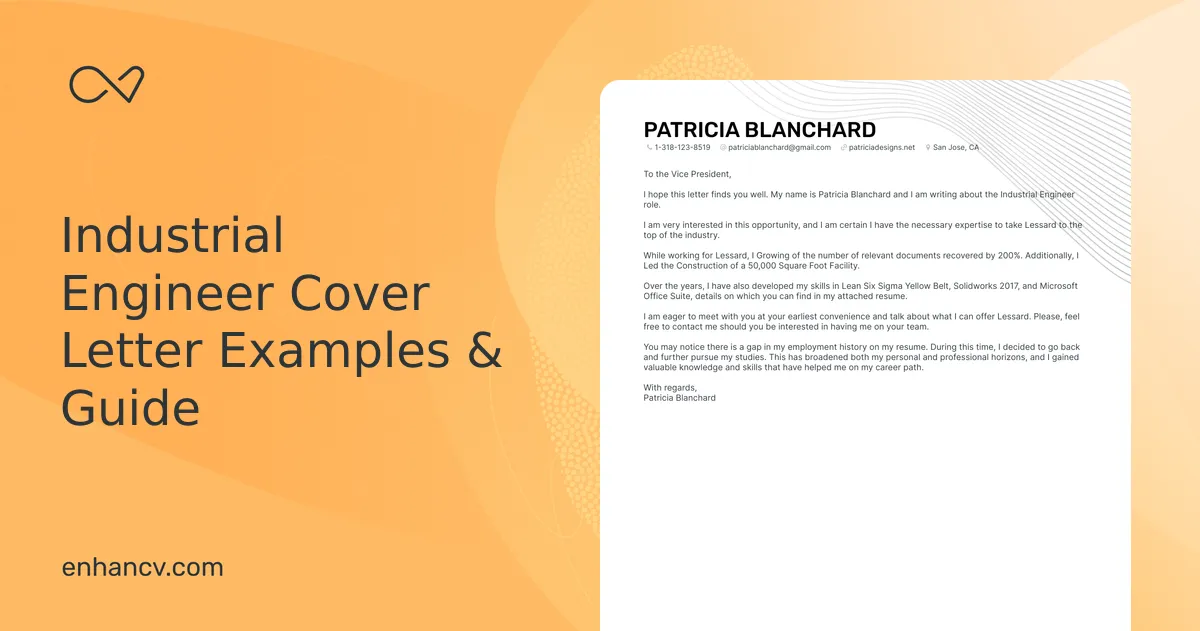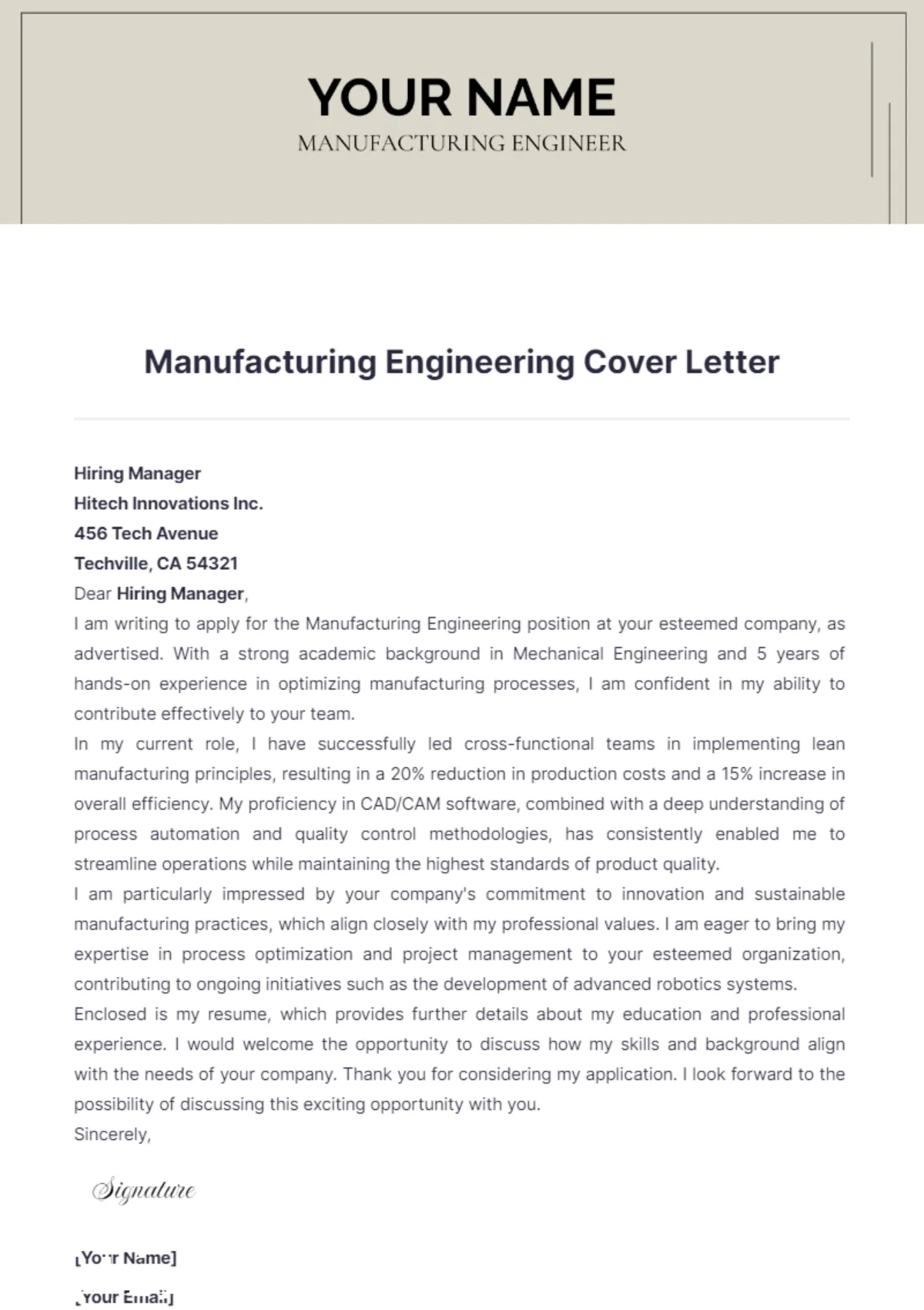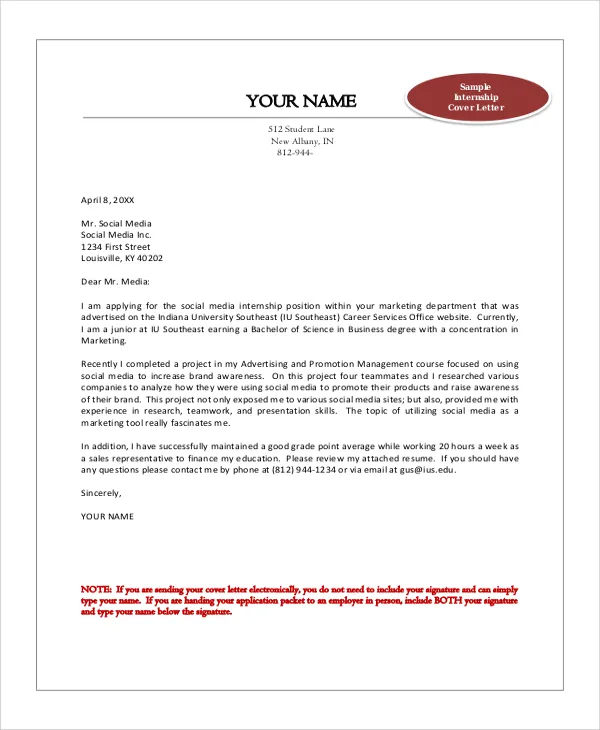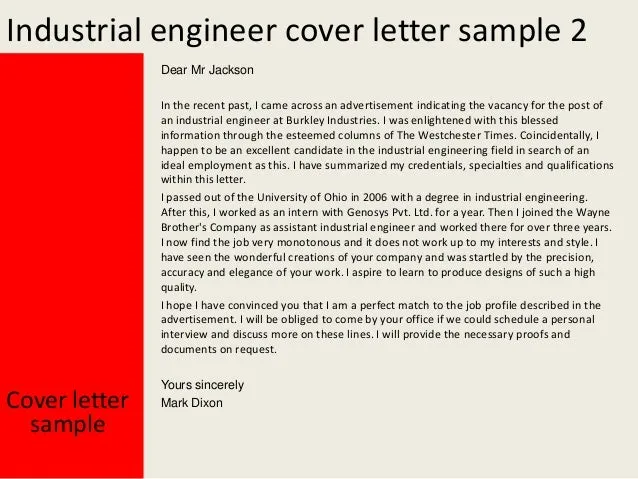Essential Cover Letter Tips for Industrial Engineering
Crafting a compelling cover letter is crucial for any industrial engineer seeking a job. It serves as your first impression and an opportunity to showcase your skills, experience, and enthusiasm for the role. A well-written cover letter can significantly increase your chances of landing an interview. The following tips are designed to help you create a cover letter that stands out and grabs the attention of hiring managers. Remember, your cover letter is more than just a formality; it’s a strategic tool in your job search arsenal. It should highlight your unique qualifications and demonstrate your understanding of the specific requirements of the position and the company. In this post we’ll explore top tips, and how to make a memorable first impression.
Highlighting Your Skills and Experience
Industrial engineers possess a diverse skill set, encompassing problem-solving, process optimization, and project management. Your cover letter should effectively highlight these skills. Begin by identifying the key skills mentioned in the job description. Then, provide specific examples of how you’ve utilized these skills in previous roles or projects. For instance, if the job requires experience in lean manufacturing, describe a project where you successfully implemented lean principles, resulting in measurable improvements in efficiency or cost reduction. Similarly, if the role emphasizes data analysis, detail your experience with relevant software and your ability to interpret data to drive decisions. Be clear and concise, ensuring that your skills align directly with the job’s requirements. Make sure to use keywords the hiring manager is searching for.
Quantifying Your Achievements

Instead of simply listing your responsibilities, quantify your achievements. Use numbers and metrics to demonstrate the impact you’ve made in previous roles. For example, instead of saying “Improved production processes,” state “Improved production efficiency by 15% through the implementation of a new workflow system.” This approach provides concrete evidence of your capabilities and gives the hiring manager a clear understanding of your value. When possible, include specific data points related to cost savings, time reduction, or increased output. This helps to set you apart and shows that you are results-oriented and have a track record of success. Quantifiable achievements make your cover letter more compelling and memorable. Always look for an opportunity to highlight your accomplishments.
Using Action Verbs Effectively
Action verbs bring your accomplishments to life and make your cover letter more engaging. Start your sentences with strong, dynamic verbs that showcase your abilities and accomplishments. For example, use verbs like ‘managed,’ ‘implemented,’ ‘optimized,’ ‘analyzed,’ ’led,’ ‘developed,’ and ‘improved.’ Avoid passive language and instead focus on what you did and the results you achieved. Consider the different areas that an industrial engineer should be skilled at and craft your letter with the right keywords to catch the attention of the hiring manager. This approach not only makes your cover letter more compelling but also emphasizes your proactive approach and initiative. Choose action verbs that accurately reflect your contributions and achievements.
Tailoring Your Cover Letter
A generic cover letter is unlikely to impress. Tailor each cover letter to the specific job and company. Start by carefully reviewing the job description and identifying the key requirements and desired skills. Then, customize your cover letter to address these specific points. Research the company’s mission, values, and recent projects to demonstrate your genuine interest and understanding. Reference specific aspects of the company or the role to show that you’ve done your homework. This level of personalization demonstrates your enthusiasm and attention to detail, making a strong impression on the hiring manager. Tailoring your cover letter also shows that you are serious about the opportunity and have considered how your skills and experience align with the company’s needs. This is an essential tip.
Understanding the Importance of Keywords

Applicant Tracking Systems (ATS) are frequently used to screen applications. To ensure your cover letter isn’t immediately rejected, incorporate relevant keywords from the job description. These keywords often relate to specific skills, software, methodologies, or industry knowledge. Review the job posting carefully and identify the most important keywords. Then, strategically integrate these keywords into your cover letter, particularly in the skills and experience sections. However, avoid keyword stuffing, which can make your cover letter sound unnatural. The goal is to use keywords naturally and contextually to make it through the ATS and capture the recruiter’s attention. Use a balance of these keywords.
Researching the Company
Before writing your cover letter, research the company thoroughly. Visit their website, read about their mission, values, and recent projects. Understand their industry, competitors, and current challenges. This knowledge will allow you to tailor your cover letter to the company’s specific needs and demonstrate your genuine interest. In your cover letter, mention specific aspects of the company that resonate with you. For example, you can discuss their commitment to sustainability or their innovative approach to manufacturing. This level of detail shows the hiring manager that you are not just sending out generic applications but are truly interested in the position and the company. This step is key in setting you apart from the rest of the crowd.
Formatting Your Cover Letter
A well-formatted cover letter is easy to read and professional-looking. Use a clear, professional font like Times New Roman or Arial. Keep the font size between 10 and 12 points. Use consistent formatting throughout your cover letter, including margins, spacing, and bullet points. Break up large blocks of text with short paragraphs and headings to improve readability. Ensure that your cover letter is free of grammatical errors and typos. A polished appearance reflects your attention to detail and professionalism. Consider using a cover letter template to guide you and ensure a consistent layout. Always proofread your cover letter before submitting it, and consider asking a friend or colleague to review it as well.
Ensuring a Professional Tone

Maintain a professional tone throughout your cover letter. Use formal language and avoid slang or overly casual expressions. Address the hiring manager by name if possible. Be enthusiastic but avoid being overly effusive. Your cover letter should be confident and assertive, but not arrogant. Focus on your achievements and how you can contribute to the company’s success. Demonstrate your understanding of the role and the industry. Proofread your cover letter carefully to ensure that your tone aligns with the company’s culture and your professional goals. Maintain a balance of confidence and approachability.
Proofreading and Editing
Proofreading and editing your cover letter is crucial to ensure it is error-free. Errors can undermine your credibility and leave a negative impression on the hiring manager. Read your cover letter carefully, looking for typos, grammatical errors, and inconsistencies. It’s often helpful to read it aloud or have someone else review it. Pay close attention to the flow and clarity of your writing. Make sure that your sentences are well-structured and that your ideas are presented logically. Correct any errors and revise any unclear or awkward phrasing. A well-edited cover letter demonstrates your attention to detail and professionalism. Proofreading ensures that your qualifications and enthusiasm are effectively communicated.
Conclusion
Writing a strong cover letter is a critical step in the job application process for industrial engineers. By following the tips outlined, you can create a cover letter that highlights your skills, quantifies your achievements, and demonstrates your genuine interest in the role and the company. Remember to tailor your cover letter to each job, use action verbs, and proofread carefully. A well-crafted cover letter can significantly increase your chances of landing an interview and ultimately securing your desired position. Good luck with your job search!
